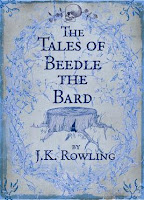The only book in this genre I have ever read.
I was reared on a heavy dose of Indian mythology, conditioned to read fantasy as mythology. When reading modern fantasy, that conditioning takes hold of me, only to mar the enjoyment this time.
Hindu mythology sets out to explain the very origin and sustaining principle of the universe and breaks into legends and lore that capture the peopling of the universe. In doing so, it undertakes the ambitious task of providing a commentary on the alleged historical events. So, while reading this book against that background, I was subconsciously seeking a bigger canvas for Rowling's stories. I don't the entire blame for this. The book's preface pushed me in that direction.
For Hindus, mythology is an article of faith. Faith prevents us from seeing fantastic elements in our myths as fantasies. Hanuman crossing the ocean in a single leap is an event recorded by witnesses, not poetic imagination. The role of a poet is to compose devotional panegyrics around those heroic acts. Some authors report that Hanuman swam across the sea. Does that sow seeds of doubt in our minds? No. Explainer: The universe goes through cycles of evolution and involution. Cosmic manifestation repeats more than it varies. While the story broadly remains the same, the enactment can differ slightly in each cycle. Ravana is killed in every Ramayana. Sometimes it's Rama, at other times Sita who does the killing. Here, mythology lifts itself out of its storytelling character and becomes an indubitable background of the cosmic rise and fall. Thus, every Hindu myth assumes abaolute historicity in the Hindu mind. And, Ganesha's elephant head strikes our Prime Minister as evidence of grafting surgeries being practised in India in the days of yore.
On one occasion, a sage out of sheer power of his penance set out to create a parallel universe. What necessitated that creation? A disgraced king, Trishanku, ingratiated himself to the sage and was transported in his very mortal person to the heaven on the earth's kerb. For this indiscretion, he was flung out of heaven. So, the sage had to exercise extra-judicial powers to fulfill his word. He needed no wand or talisman to create a mint fresh universe that replicated the known universe to its minutest details, including its own Brahma, the Creator Inductee. While he was raising the king to the homespun heaven with his mind power, the sage Vishwamitra was dissuaded by the heavenly sage Brhaspati. Vishwamitra finally abandoned his project conceived in haste. Trishanku was suspended upside down in a region that was later conferred the status of a constellation. His uncertain state has acquired an eponymous name and refers to a state of uncertainty, for instance, a hung parliament is referred to as trishanku sansad. That's the scope of Hindu myths perfected over many millennia! So much of it has even seeped into our language.
This book has some interesting stories, though. But without the Harry Potter background, I am immune to the frenzy that the book is expected to generate. The chapter following each story traces the events of the story to a historical context, again all imagined but to be gullibly consumed (I know I don't have to say that). Unbelievable that readers willingly descend into sheer make-belief: Dissertation on magic wands (they absorb the power of its wielder, so change of hands can affect its style and functioning), wizardry cults, and an unbroken history of wizardry to back it up!
Thankfully, except death, everything else can be magiced away in these tales. Without death as the terror in waiting, even fantasy loses its edge. A heroine brought back from dead is a hazy unresponsive apparition that doesn't belong to this world. The hero (a wizard) has no choice but to join her by suicide. Death and the fact that the two worlds don't overlap bring some sanity to the whole genre, some similacrum of the life-like struggle.
The stories have a tellingness about them; of being recounted by a granny to kids of impressionable age. These stories belong to minds that can work up wonder and excitement and stove them away as unadulterated memories of childhood. To an adult of poor imagination, they are pearls cast before a swine.

Comments